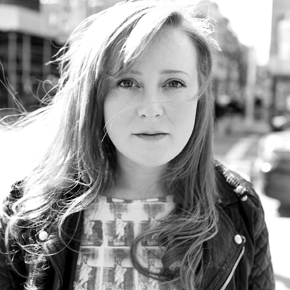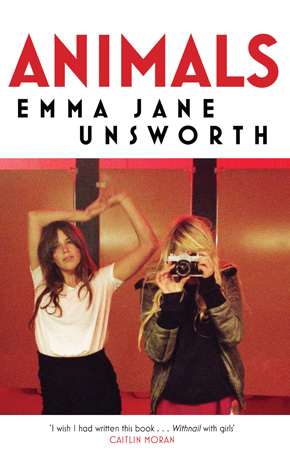Emma Jane Unsworth gets rowdy
by Emma YoungAnimals by Emma Jane Unsworth is the hilarious account of the friendship between Laura and her best friend Tyler as they navigate their nights out, days spent hungover and the relationships they develop along the way. I ask her about the origins of the novel and how it speaks to our times, and she gives me the best line I’ve ever heard in an interview: “I felt it was right to keep my penis in.”
EY: Company magazine has already described the book as “SO much more relevant than Bridget ever was.” Unforgivable slur on Bridget aside, they’re clearly correct in their assertion that you’ve captured the Girls generation zeitgeist with Animals. Why do you think the novel is so relevant, and was it something you were conscious of as you were writing?
EJU: Well, thank you! I’m very flattered to be accused of capturing the zeitgeist but I’m also utterly terrified because I really don’t know how I did it, if I did it – and I REALLY don’t know how I’m going to do it again. It was total fluke. Does anyone know where I can get hold of a zeitgeist net? Because I think I need to get professional on this from now on. Really though, I didn’t see Girls until I’d done the first draft of Animals, and I loved how raw and unabashed it was. Then I saw that the book and the TV series had a penis selfie in common, and I wondered whether to take my penis out, lest I be accused of copying. However, after discussing it with my editors and friends I learned that these penis selfies were a bit of a ‘thing’, so I felt it was right to keep my penis in.
I think it’s fair to say that Laura and Tyler’s friendship is built, in part, on a routine of excessive drinking and being hungover. I read this as a reaction to and escape from the external and internal pressure to get married and have children once you reach your late twenties – is that fair or am I, er, projecting?
Haha – don’t worry, I’m a big fan of projecting. It’s the evil twin of empathy. And you’re spot-on. Their drinking and hangover regime takes up a lot of time and energy. Also, the effects alcohol has on Laura’s mind is to shut down the parts that worry and overanalyse – she self-medicates in that way. Tyler’s happy where she is, living in a cycle. Laura isn’t happy any more but she doesn’t know where to head next, she’s lost and terrified, so she drinks to numb the fears. But it can’t last, that kind of avoidance. The daily details can be numbed away, but the things she’s worried about are massive. Seismic. Sea-change-y. But drink is just one of the things she uses to manage her head. The root cause of her troubles has everything to do with the people around her. I was determined not to make it a cautionary tale. It’s a pro-alcohol novel. They’re not addicts, so why should there have to be rehabilitation or reform? Theirs is a valid way of life.
Laura seems conscious of her social background and it’s referenced several times in the book. Why do you think it matters to her? And do you feel as though, once you move away from home and meet people from different backgrounds, the differences between how you grew up become more important or less (obviously drinking helps)?
I think Laura feels a lot of middle-class guilt for being born working-class and then aspiring to be better educated. Knowledge is the thing for her – the meaning of ‘The Good Life’. Which is pretty bourgeois, no? And she knows that, but she can’t help it. And of course it starts with prep school and before you know it you’ve got an Aga and a wine rack and a Sex Pistols poster in an IKEA frame in your downstairs toilet. Who knows where all that shit really ends?
Following on from that question, why did you set the novel in Manchester?
Only Manchester would have tolerated these two for so long – and even Manchester’s getting fed up of them by the time of the novel. Also, someone needed to set a book in Manchester that didn’t reference the Hacienda. Oh balls, I think mine actually does at some point, doesn’t it…
Tyler is a hugely sympathetic character, despite being selfish and irresponsible (at best). I know you’re obviously not supposed to have favourites, but did you enjoy writing her more than Laura, and can she get a spin-off novel, please?
I did enjoy writing her more. The book was originally called The Rogue, which for me referred to Tyler. She’s the star of the show for me. She’s my darkest, rowdiest, ruthlessly sovereign parts. Which are also the survival parts, I think, half the time. In my head she looked like Vasquez out of Aliens. I always picture my characters as characters out of films or off TV while I’m writing them. Jim was Spock from the new Star Trek. Marty was Hooper from Jaws. Laura was Claire from Six Feet Under.
I found the milestones that Laura has to deal with in the book, and they’re all the clichés of growing up – parental illness, relationships with friends and partners changing – incredibly poignant. She’s reluctant, as most of us are, to grapple with what you have to give up to grow up, and it was refreshing to read about her struggle without feeling pushed into judging her. I loved your quote in the Guardian earlier this year: “I felt as though there weren’t many stories that featured women just dicking about, and I also wanted to address the idea that if you keep partying, you’re an idiot or a failure – like there’s just one way to live, which there isn’t.” Can you talk a bit about that, and learning to deal with proper grown-up problems like – ugh – a proper grown-up?
I’m so glad you enjoyed all that and found it non-judgy. I worry my morality – which is ever-changing – comes through too hard sometimes. As for the grown-up problems… You know what’s the get-out here? And I swear I’m not trying to be glib and unintellectual, but I don’t actually know what this whole ‘growing up’ thing actually means. Is it just controlling your worst instincts? Your wild desires? Is that it? Or is it buying a house, partnering off with someone, popping out a sprog or two? Owning a cafetière? What is it? Someone give me a checklist. I’m confused. Because, for some reason in our society, stasis of social situation is seen as a failing, regardless of what your mind might be up to. We have all these external milestones and markers that are too often prioritised, and photographed. Jesus, the photos. Desist with the photos, people. This is why I left Facebook.
A couple of writer questions: which writers or books have inspired you, and what are you reading at the moment?
My favourite writers are Sarah Hall, Lorrie Moore and Glen Duncan. I just read a Muriel Spark for the first time. The Driver’s Seat. I liked her spikiness and oddball humour. I’ve just started a debut novel called Randall by Jonathan Gibbs, set in the 90s art world, which is out in June from Galley Beggar Press. I’m lucky enough to have got a proof. It’s the kind of loving satire I wish I were smart and brave and organised enough to write.
Finally, your first novel was about food (kind of), your second about drink (kind of): what are you working on next?
A chase story set in a campervan about a woman who has done the worst thing imaginable to her ex-boyfriend. No, even worse than that…
 Emma Jane Unsworth‘s first novel, Hungry, the Stars and Everything, won a Betty Trask Award from the Society of Authors and was shortlisted for the Portico Prize for Fiction 2012. Her second novel, Animals, is published by Canongate in paperback and eBook. Read more.
Emma Jane Unsworth‘s first novel, Hungry, the Stars and Everything, won a Betty Trask Award from the Society of Authors and was shortlisted for the Portico Prize for Fiction 2012. Her second novel, Animals, is published by Canongate in paperback and eBook. Read more.
emmajaneunsworth.com
Author portrait © Darren Hall
Emma Young, a former arts publicist and literary night host, is a contributing editor and events manager at Bookanista. Follow her on twitter: @emmaryoung


